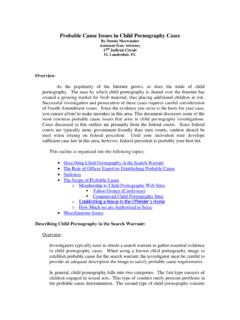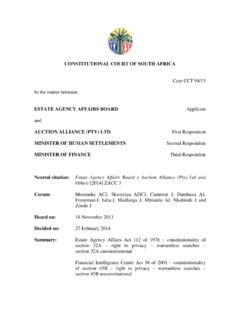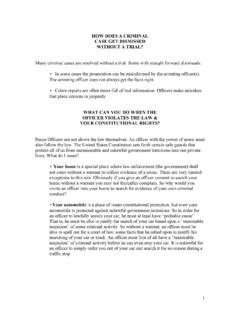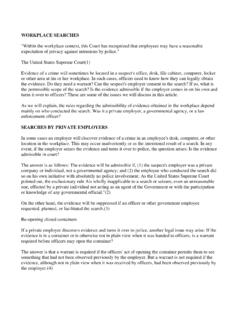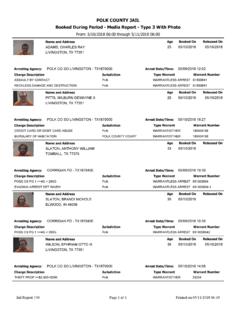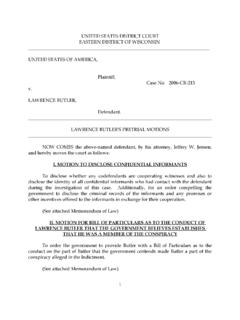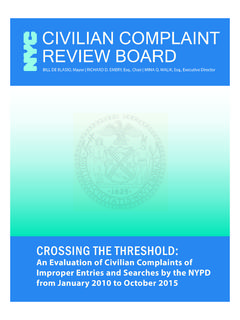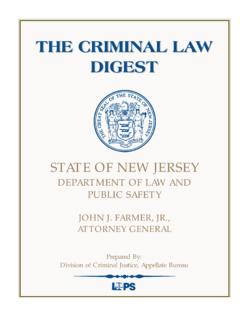Transcription of Consent Searches - locatethelaw.org
1 Consent Searches By Dennis Nicewander, Assistant State Attorney 17th Judicial Circuit, Broward County, FL Constitutional 2 Florida Constitution: Article 1, Section 12.. 2 United States Constitution: Fourth Amendment .. 2 Consent Searches .. 2 Commenting of Refusal to Consent .. 3 Computer Repairman Consent Searches .. 3 Coercive or Involuntary Consent .. 9 Family or Household Members Granting Permission to Search: .. 25 Other 42 Friends or Bailee Granting 43 Hearsay: Testimony Concerning Consent to Search is 43 Hospital Searches .. 44 Hotel and Motel Searches .. 45 Knowledge of the Right to Refuse Consent .. 54 Motivations of the Consenting 55 Nonverbal Consent to Entry of Home .. 56 One Party Objection to 57 Private Party Searches -Exceeding the Scope.
2 61 Revocation or Withdrawal of Consent .. 65 Scope of Consent .. 68 Consent Searches D. Nicewander Page 2 Constitutional Provisions Florida Constitution: Article 1, Section 12. The right of the people to be secure in their persons, houses, papers and effects against unreasonable Searches and seizures, and against the unreasonable interception of private communications by any means, shall not be violated. No warrant shall be issued except upon probable cause, supported by affidavit, particularly describing the place or places to be searched, the person or persons, thing or things to be seized, the communication to be intercepted, and the nature of evidence to be obtained. This right shall be construed in conformity with the 4th Amendment to the United States Constitution, as interpreted by the United States Supreme Court.
3 Articles or information obtained in violation of this right shall not be admissible in evidence if such articles or information would be inadmissible under decisions of the United States Supreme Court construing the 4th Amendment to the United States Constitution. United States Constitution: Fourth Amendment The right of the people to be secure in their persons, houses, papers, and effects, against unreasonable Searches and seizures, shall not be violated; and no Warrants shall issue but upon probable cause, supported by Oath or affirmation, and particularly describing the place to be searched, and the persons or things to be seized. Important Note: The conformity clause of Article 1, Section 12, mandates that Florida must follow the case law established by the United States Supreme Court in Fourth Amendment matters.
4 In general, individual states can provide citizens with more protections than afforded by the United States Constitution, but not less. The Florida courts have frequently rejected rulings by the Unites States Supreme Court and imposed greater restrictions on police conduct than federal law requires. The Florida Constitution prohibits this and therefore, United States Supreme Court cases are the ultimate controlling authority. Please take note that the conformity clause has been in existence since 1982, so cases decided prior to that date may no longer be valid. See State v. Scott, 26 Fla. L. Weekly D22 (Fla. 3d DCA 2001). Consent Searches Consent Searches D. Nicewander Page 3 Commenting of Refusal to Consent Bravo v.
5 State, FLW (Fla. 1st DCA 2011): Trial court abused its discretion in allowing State's use of evidence commenting on assault defendant's Fourth Amendment refusal to Consent to a police officer's request to conduct a warrantless search of his home for a gun, as well as State's subsequent emphasis on defendant's exercise of that right in closing argument. Computer Repairman Consent Searches General Rules: A computer repairman is not a government agent and therefore his Searches are not subject to 4th Amendment. The repairman can become an agent of the government, however, if law enforcement directs him to search for more evidence. It should also be noted that the repairman may become an agent of the government if the police know and acquiesce in his continued search and he is searching for the benefit of the police.
6 Generally, the repairman can reconstruct for the police what he already done on his own, but cannot expand his search for the police. The safest course of action, especially under state law, is to take a detailed statement from the repairman about his observations. If his observations are clear and explicit, a warrant can be obtained based on his sworn testimony. If he is not clear about the age of the children or the nature of the sexual acts, such as mere nudity, the officer should simply observe what the repairman viewed prior to calling the police and look no more. The repairman should then be instructed to cease his search for images and secure the computer pending a warrant.
7 If circumstances show that the computer may be in danger of tampering or destruction, the computer can be seized for a short period of time while obtaining the warrant. Don t ask the repairman to copy the images to a disk, because it will make him you agent. If you look at more than you should, present the warrant based solely on the statement of the repairman and leave out the fact that you viewed extra images. Consent Searches D. Nicewander Page 4 Federal law suggests that your mistake will not be fatal as long as the judge does not rely on it in the warrant. United States v. Hill, (9th Cir. 2006) Facts: Agents got a search warrant for suspect s residence after repair shop advised them they had seen child pornography on computer.
8 When they went into home with warrant, the computer was not there, but they seized storage media that was later found to contain child pornography. The court ruled that the repair shop worker s description was sufficient to support probable cause. United States v. Peterson, (South Carolina 2003) Computer Repair Shop Facts: Computer repairman found child pornography during a repair of computer. He was aware of a South Carolina law that required repairpersons to report child pornography if found during a repair. He reported his findings to police and a warrant was issued. Holding: Legal requirement to report child pornography did not make repairman an agent of the state and thus, no 4th amendment violation. In light of the strong presumption in favor of warrants, and in light of the common sense approach used in testing the validity of those warrants, the magistrate had enough information to issue the warrant.
9 The magistrate had a direct statement from an eye-witness that the computer in question contained pictures of pre-pubescent boys in various stages of undress and other boys (unidentifiable as to age) engaged in sexual acts together with links to "underage" internet cites. Together these facts were enough evidence for the magistrate, using the common sense totality of the circumstances test, to find that there was probable cause that defendant's computer contained items subject to seizure. In the present case, Griffin claimed that defendant "left the store to go home and get his computer" after a conversation about the problem with the computer. The government asserts that this direct statement by the witness, together with a common sense argument that computers are usually stored in the home, provide a sufficient nexus between defendant's residence and the evidence observed on the computer.
10 Furthermore, the computer was a "desktop," not capable of easy mobility, and the images were of a private nature, all suggesting that the Consent Searches D. Nicewander Page 5 computer was likely maintained in a private residence. United States v. Grimes, 244 375 (5th Cir. 2001): Computer Repair Shop Facts: The defendant s wife took his computer to a repair shop for repair. The technician noticed that the hard drive was almost full and asked the wife for permission to delete some of the image files on the computer. The wife consented and the technician searched for jpg files to delete. During this routine procedure, the technician observed child pornography. A local detective was called and the technician showed him the images.
